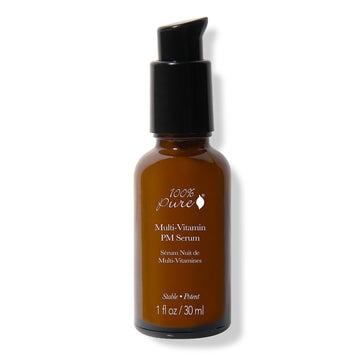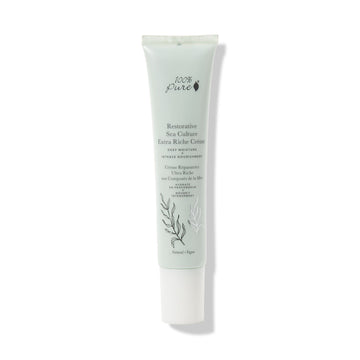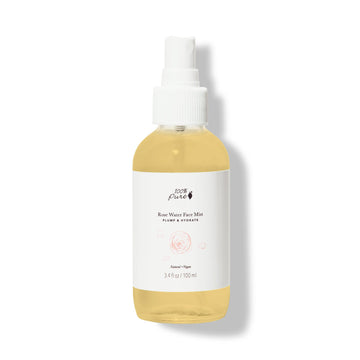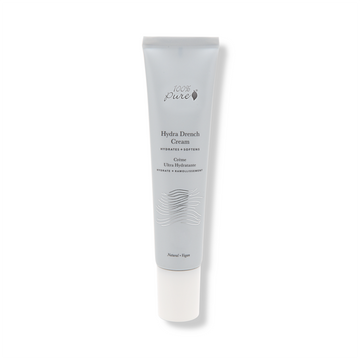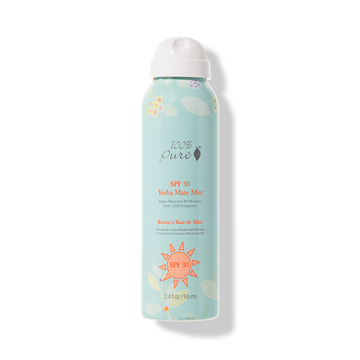Unlock the Secret to Resilient, Glowing Skin by Restoring Your Natural Defense
Posted on August 12, 2024 Written by: 100% PURE®
We’re usually quick to react to a big blemish or spotting “11 lines” when staring intently into a 10x magnification mirror. But as uncomfortably close as we get to the mirror, it won’t show one crucial skin factor - our skin barrier. Even if you beckon “mirror, mirror, on the …. it’s not likely to show you what’s really going on with our protective layer.
As the outermost layer of skin and the first layer of defense, a healthy skin barrier is the key to skin health. When skin issues like dryness, irritation, and sensitivity arise, it's usually because this barrier has been compromised. Unfortunately, many people suffer from a damaged skin barrier without even seeing or realizing it, leading to these common skin problems and a reflection of frustration.
But don't worry! There are simple, effective ways to repair and strengthen your skin barrier. With a little TLC and some magical products, you can reclaim your healthy glow and inner queen. In this deep dive, we’re going beyond the surface on how to help your compromised skin reclaim its former glory. Mirror your efforts, and you’ll achieve mirror-acles!
Understanding Your Skin Barrier
“Mirror, mirror, on the wall”, what is the skin barrier after all?
To answer this question, it helps to understand the way our skin is structured and what magical role the skin barrier plays in our skin.
It’s worth noting that the skin is made up of several different layers. But to generalize, let’s just talk about the three main layers: The topmost layer, or epidermis, the middle layer, which is known as the dermis, and the bottom layer, or hypodermis.
The skin barrier, or stratum corneum, is the outermost layer of your skin and your skin’s first line of defense. Think of it as a protective shield that guards your skin from external threats like pollution, bacteria, and UV rays. Composed of tightly packed cells and lipids (fats), which, together, form the skin’s natural moisturizing factor. Natural moisturizing factors play an instrumental role in keeping the skin hydrated and healthy by locking in moisture and preventing water loss.
While the skin barrier performs a number of different roles, it’s generally agreed to perform three main functions: retaining moisture, transporting nutrients, and protecting the rest of your skin from the environment around it. Because of the essential roles it plays, the skin barrier is a major determinant of your skin’s overall health and appearance. When the skin barrier is functioning properly, your skin appears smooth, healthy, and radiant.
Conversely, a skin barrier that’s damaged can't perform its protective functions effectively. Signs of a damaged skin barrier include dryness, where the skin feels tight and may start to peel, and redness, which indicates inflammation and irritation. Increased sensitivity is another common sign, making your skin more reactive to products and environmental factors. Other indicators include premature aging, dullness, itchiness, and a higher incidence of breakouts or other blemishes.
So, what are some causes of skin barrier damage you should avoid for the fairest skin of all?
More often, damage happens when we’re a little too harsh on our skin. For some individuals, they might find that their skin barrier becomes damaged after heavy exfoliating, or smearing their skin with products containing retinoids or alpha hydroxy acids. Using conventional skincare products which are laden with harsh chemicals and drying sulfates strip too much of your skin’s natural oil and, in turn, cause damage to your skin barrier.
Recognizing these signs and causes is the first step toward repairing and strengthening your skin barrier, so you can get back to having healthy, radiant skin – and a future with the strongest, most resilient complexion.
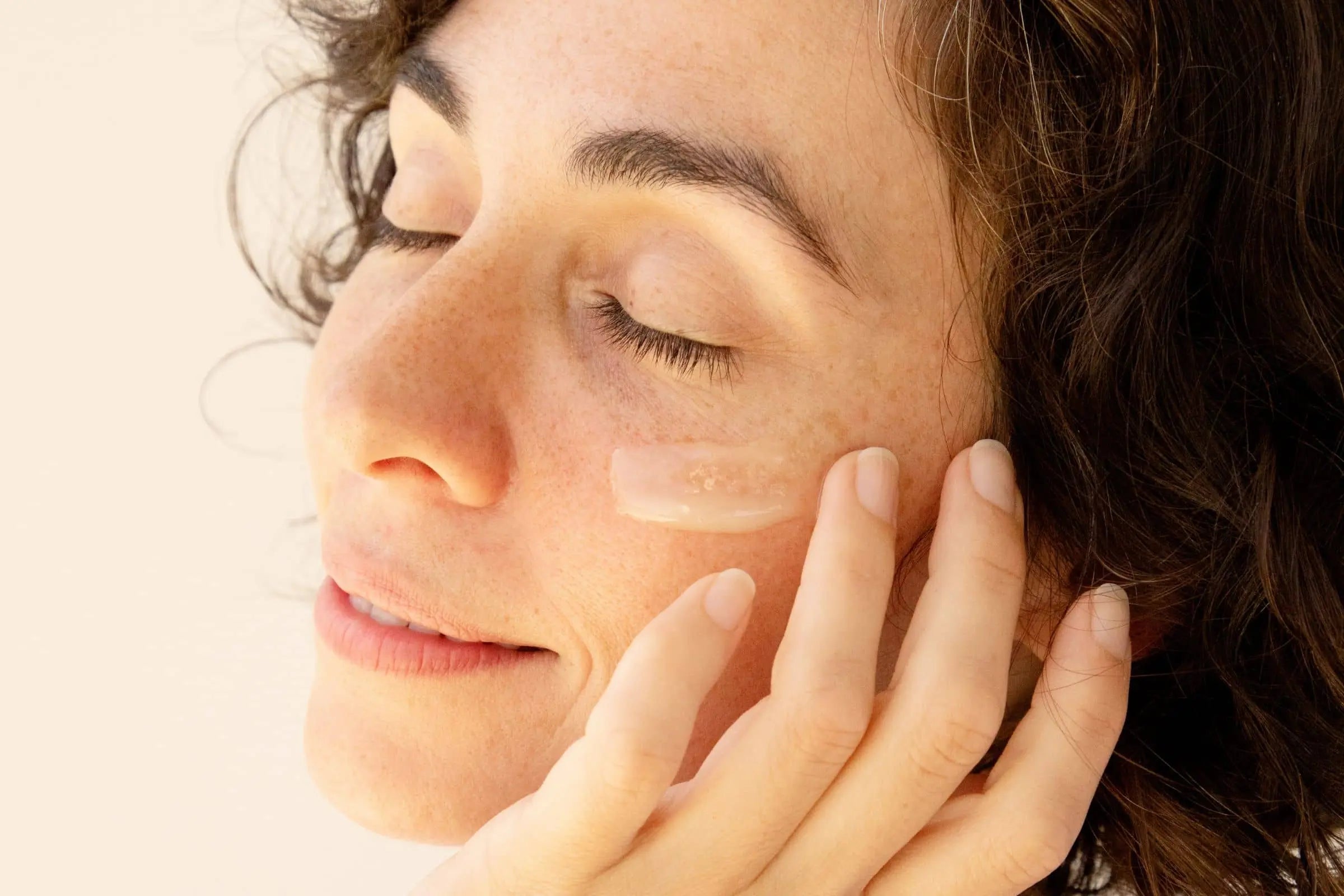
The Journey to Skin Restoration
To take back your skin barrier’s crowning glory, one of the best places to start is recognizing the need to change your skincare routine with products that target the repair and rebuild of its health. To keep your skin barrier strong and healthy, incorporating the right ingredients into your skincare routine is crucial.
Here are some natural powerhouse ingredients and benefits that effectively rebuild and reinforce the skin barrier:
Ceramides:
You’ve probably come across ceramides in skincare formulations and had no idea what they are or what they do among the plethora of beauty ingredients out there. Ceramides are essential lipids naturally found in your skin and are the building blocks of a healthy barrier. Ceramides play a key role in retaining moisture and protecting against environmental damage. They like to ‘stick’ together and act as the glue to help seal in moisture and maintain the skin's hydration levels, ensuring it stays firm and plump.
Speaking of skincare formulations, you need to be aware of synthetic versus natural ceramides in many products. Simply, synthetic ceramides are created in a lab without using plant-origin building blocks. If your skin barrier is already damaged, resulting in skin sensitivities, using synthetic ceramides could exasperate your skin concerns and already damaged skin barrier.
Alternatively, natural ceramides are derived from plants like oats and rice through a fermentation process. A few grains have ceramide compounds in them that can be extracted and used on the skin without further alteration. Rice, wheat, and corn can all provide natural ceramide compounds.
The great news is that we have natural and effective products that feature the soothing and moisturizing properties of oryza/rice ceramides, which prevent water loss and strengthen the natural skin barrier. We have those natural and effective ingredients in our formulas and a few star products under our sleeves. But we don’t gate-keep the secrets to natural beauty and our enthusiasts!
Niacinamide:
Imagine a single ingredient that can transform your skin’s texture, tone, and overall health. As a multi-tasking skin savior, the magic of niacinamide, also known as vitamin B3, lies in its multifaceted mechanism of action. At the core, it strengthens the skin barrier, which is crucial for maintaining healthy skin. A robust skin barrier ingredient, niacinamide enhances moisture retention, preventing dryness and ensuring your skin stays hydrated and supple.
Additionally, niacinamide is known for its anti-inflammatory properties, which help soothe irritated skin and reduce redness. It balances oil production, making it a fantastic option for those with oily or acne-prone skin. By regulating sebum production, niacinamide helps keep breakouts at bay and minimizes the appearance of enlarged pores.
A strong skin barrier is essential for healthy, resilient skin, and niacinamide plays a crucial role in enhancing this barrier function. Moreover, niacinamide boosts skin elasticity and resilience, resulting in a complexion that not only looks healthier and smoother but feels more robust and capable of withstanding daily challenges.
Moisturizing agents: Hydration heroes:
Humectants: hyaluronic acid and glycerin
Hyaluronic Acid is known for its incredible ability to hold up to 1,000 times its weight in water, hyaluronic acid is a hydration hero. It deeply moisturizes the skin, helping to maintain its moisture balance and keeping the barrier intact and functioning optimally. And once it delivers hydration to your skin cells, it also helps lock in the precious H2O. Hydration is also important to keep your skin looking its radiant best
Glycerin has a unique quality to better penetrate the skin and truly encourage moisture on multiple skin levels. As a humectant that attracts water to your skin, glycerin helps to combat dryness effectively to moisturize dry skin and keep precious moisture trapped in your skin. And since we tend to become drier as we age – exacerbating signs of aging – hydration is crucial for a more youthful complexion.
Because glycerin is an emollient or super hydrator, regular use of skin care products including glycerin can help reduce the appearance of fine lines, cracks, and scales in the skin. As a skin-reparative humectant, glycerin seals in moisture and promotes lasting moisture by drawing it in from the environment. More on emollients and humectants below!
Emollients and Occlusives:
Emollients are the happy helpers of a moisturizer: they leave everything lovely and smooth! These ingredients will provide some occlusive properties, but their main functions are to restore and soften the skin. Emollients also help replenish any damage on the surface of your skin.
Emollients are effective at filling in the cracks and crevices of dry skin or fine lines. Shea butter, cocoa butter, vitamin E, jojoba, and rosehip oils are all common emollients. Others include lipids, colloidal oatmeal, squalane, and isopropyl palmitate. Lastly, emollients are lonely by nature and have more skin benefits when paired with a humectant and occlusive.
Occlusives help to trap precious H2O. Otherwise, humectants will lose their water-binding powers if the moisturizer type doesn’t have a trap. Occlusive ingredients create a physical barrier on the skin to prevent transepidermal water loss and lock in hydration. The more common occlusives (not that we recommend the following) come in the form of silicone, petroleum jelly, dimethicone, waxes (carnauba and beeswax), mineral oil, and lanolin. Zinc also creates a water-worthy barrier: think diaper ointment or lifeguards with those funny white noses.
We use nutrient-packed and concentrated blends of rich butters and superfruit oils as well as nourishing antioxidants in our occlusive-based, super moisturizers.
Your Action Plan for Rebuilding the Skin Barrier
So, what happens when we’re in need of some skin barrier repair? Just as you’d have a quick plan to zap that zit or treat those 11 lines – or use a less powerful mirror – the same goes with skin barrier repair.
Luckily, we can repair and strengthen our skin barrier with ingredients that benefit our skin all year round, especially when it comes to ingredients like fatty acids, ceramides, and humectants.
Here are some of the best tips for skin barrier repair:
Simplify Your Skincare Routine
It’s possible you’ve been in this situation: your skin is irritated and inflamed, but you might think to yourself, “How could this be happening? I use so much skincare!”
However, this may be where the issue lies.
When we constantly subject our skin to a wide array of different products and superactives, we run the risk of overwhelming the skin barrier, which can greatly weaken it. In the quest for the fairest skin, which means a healthy skin barrier, it’s best to simplify your daily routine. We have some easy tips and products below to make your skin regimen work for you and your skin barrier than against it!
Incorporate gentle, barrier-supporting products:
There are products on the market that can help repair the skin barrier, and they can be identified by the ingredients they contain. But are they really the best products to target and repair a damaged skin barrier without the use of harsh ingredients?
When shopping for barrier repair products, check for ingredients that can help restore the skin barrier like niacinamide, ceramides, and fatty acids. Soothing ingredients like aloe vera, rose hydrosol, and calendula can also help ease redness and inflammation that may occur with a damaged skin barrier.
Choose a pH-balanced cleanser:
Moisturization is essentially adding essential hydration to the skin, helping to repair and reinforce the lipid barrier. Those with dry skin types will benefit from using moisturizing products since having a dry skin type means that the lipid barrier is compromised. When there is less oil production in the skin, the result will be less protection from water loss and a higher risk for dehydrated skin.
No matter your skin type, we have your back – and complexion! For a damaged skin barrier, choose a pH-balanced cleanser to bring your complexion back to healthy harmony.
Adding a hydrating toner or essence:
Toner is the wingman to our cleanser, sweeping into pores to remove any lingering impurities. We also see the added benefits of hydrating the skin, balancing skin pH, and tightening pores for a smoother complexion. These are all essential benefits to restoring a damaged skin barrier.
Selecting serums with barrier-repairing ingredients:
In any good-for-the-skin routine, and certainly a skin-barrier-repairing regimen, a serum would be key in locking the essential nutrients in from the toner and forming a protective barrier with a serum. Beyond that, think of face serums as your daytime ‘treatment’ product. They’re normally concentrated with antioxidants to defend skin during the day and added vitamins for targeted results. Look for an intensely hydrating serum to lock in essential moisture and revitalize dehydrated skin cells.
Using a ceramide-rich moisturizer:
If your skin barrier is damaged and you’re using a heavy, occlusive moisturizer, this may be your sign to switch things up.
Occlusive moisturizers tend to contain ingredients like shea butter, coconut oil, and cocoa butter. And while they may do wonders for maintaining your skin’s water retention, they might be leaving your skin feeling a bit smothered. When repairing your skin barrier, give it a chance to breathe by using moisturizers that are lightweight and soothing. It’s best to use a ceramide-rich moisturizer. We have the best ones detailed below!
Lifestyle changes to support skin health:
On the quest for rebuilding your skin barrier, the right products and actions for really repairing your outer layer of skin and keeping it in optimal condition care can make a significant difference in your sensitive complexion. However, to really get to skin-adise, we need to lend a mirror to our skin health routine by supporting it with a healthy lifestyle.
Include foods rich in vitamins, antioxidants, and healthy fats. What you eat has a direct impact on your skin’s health. A diet rich in vitamins, antioxidants, and healthy fats supports the skin barrier from the inside out. Foods like avocados, nuts, seeds, and berries provide essential nutrients that help repair and maintain the skin barrier. Ensuring a balanced diet with these components helps keep your skin nourished, hydrated, and better equipped to defend against environmental stressors.
It’s important for the integrity of your skin barrier to stay hydrated. Drink plenty of water throughout the day. Staying hydrated by drinking enough water is fundamental for skin health Proper hydration supports the skin’s natural barrier function, ensuring that it remains supple and elastic. When your body is well-hydrated, your skin cells function optimally, which helps maintain a strong barrier and prevents issues like dryness and irritation.
More, get adequate sleep. Aim for 7-9 hours of quality sleep each night. Sleep is a critical time for skin repair and regeneration. During sleep, your body goes into repair mode, fixing damage and renewing skin cells. Getting 7-9 hours of quality sleep each night allows your skin to recover from daily stressors and maintain a healthy barrier. Adequate sleep ensures that your skin stays resilient and able to protect itself from environmental damage and irritants
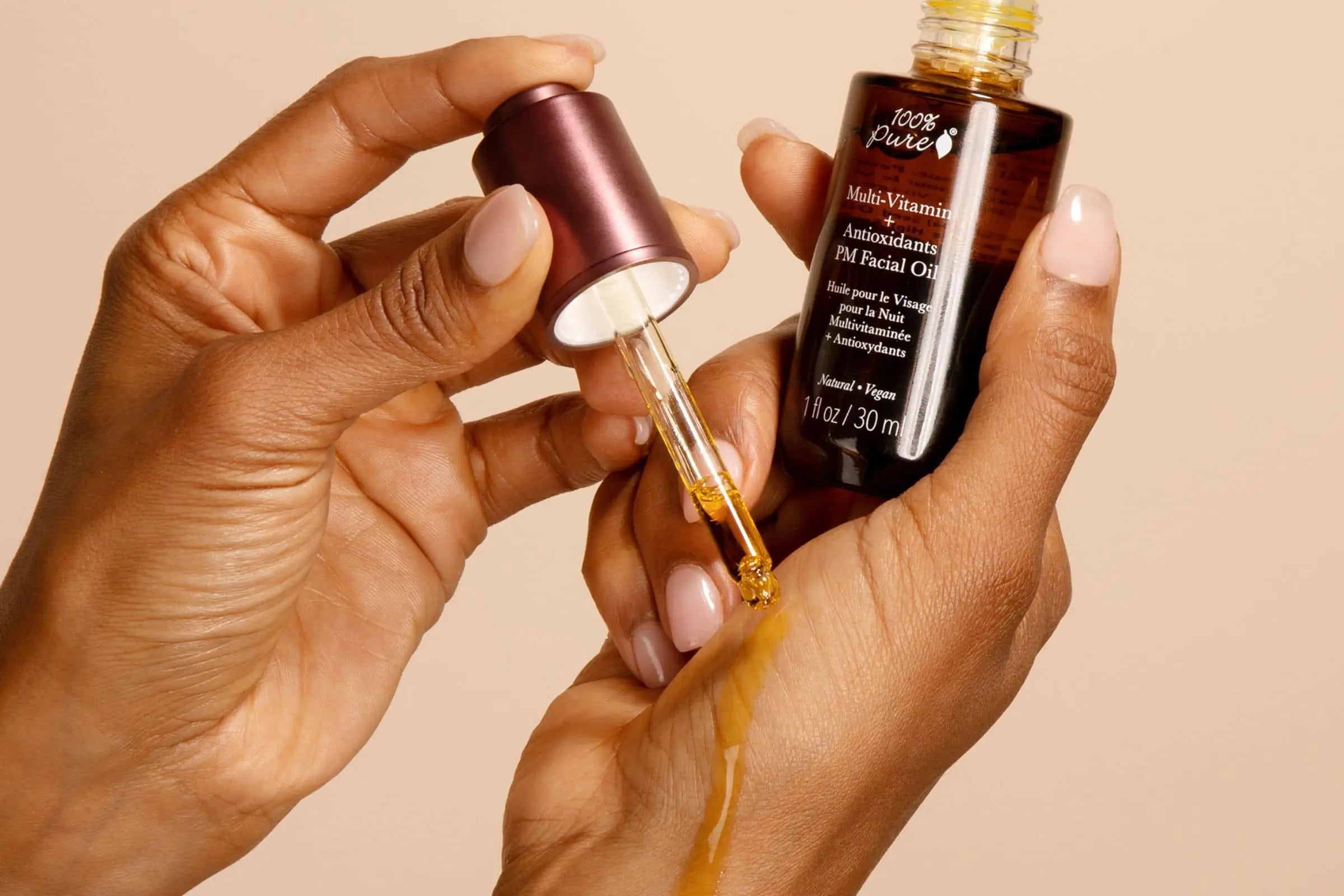
100% PURE Products for Your Skin Barrier Repair Journey
At 100% PURE, we believe that nature holds the key to healthy, radiant skin. That's why we've meticulously crafted our products from natural ingredients that nourish and support the skin's barrier function.
Our formulas are free from harsh chemicals, synthetic fragrances, and artificial preservatives, ensuring that every ingredient works in harmony with your skin's natural processes. From hydrating coconut milk to antioxidant-rich green tea and skin-loving fruits like acai, we source the finest natural ingredients to create products that not only repair but strengthen the skin barrier.
Start repairing your skin barrier today with 100% PURE products and their benefits for healthier skin.
Multi-Vitamin + Antioxidants Potent PM Serum
Key ingredients: Niacinamide, vitamins C and E
This potent night serum is a synergy of stabilized vitamins designed to reduce the appearance of fine lines and wrinkles, while firming, brightening, and evening out skin tone. What sets it apart is the unique formulation of niacinamide and vitamin C — two celebrated anti-aging ingredients. While they’re usually not combined due to differing pH levels, this serum uses magnesium ascorbyl phosphate. This high-quality form of vitamin C has a pH of 6, which is identical to niacinamide. This harmony allows the two vitamins to work cohesively, ensuring a youthful and glowing complexion.
Restorative Sea Culture Extra Riche Créme
Key ingredients: Seaweed Polysaccharides (Algin) Alteromonas Ferment Extract
This luxe face cream is ideal for dry, sensitive, and aging skin types, thanks to seaweed polysaccharides and alteromonas, a proteobacteria found in coastal waters and the open ocean. This plumping, rich, luxurious face cream drenches skin with deep moisture while delivering nutrient-rich sea minerals, antioxidants, amino acids, vitamins, and other beneficial trace elements for a healthier, softer complexion. Skin-plumping seaweed polysaccharides and red algae lock in long-lasting hydration for abundantly supple, nourished skin.
Key ingredients: Rose hydrosol, glycerin, aloe, and white tea
Made with rose hydrosol to balance pH, this soothing and gentle skin spray reduces redness, lightly moisturizes skin, and prepares it for further treatment. Hyaluronic acid delivers a double dose of hydration to quench dry, sensitive, or dehydrated skin and boost glow. Tips: Use after cleansing to balance the skin’s pH.
Key ingredients: Hyaluronic acid, rose water, chia seed gel
This lightweight, quickly absorbing formula effectively re-hydrates thirsty skin with omega fatty acid-rich gel water from chia seeds and locks in hydration. Tips: Follow with a suitable moisturizer to maintain hydration.
Key ingredients: Yerba mate, safflower oil, jojoba oil
This mattifying formula uses Yerba mate tea leaf to provide sun protection and to fortify skin with antioxidants, to help protect against damaging free radicals and environmental pollutants. Tips: Apply sunscreen every morning to protect your brightened skin from UV damage.
Conclusion
“Mirror, mirror, on the wall (or window), who’s the fairest of them all? Why it’s you, and only you. If you’re looking to rebuild your skin barrier, there are a few things to keep in mind. The time it takes to damage your skin’s barrier will need to repair the skin barrier, and it can vary depending on the severity of the damage, the underlying cause, and an individual's skin type. In general, minor skin barrier damage may take a few days to a week to heal, while a more severely compromised barrier may take several weeks to months to fully recover.
If you want to be a role as the hero or queen in your skin transformation, you should join countless others who have turned their skin from damaged to dazzling using the best skincare products to repair a damaged skin barrier. Embrace these tips and products and witness the transformation in your own skin for yourself. Visit our website to explore more customer reviews and find the perfect products for your skincare needs. Achieve radiant, healthy skin with 100% PURE’s natural and effective products!
Just remember when you look any mirror: Mirror your efforts, and you’ll achieve mirror-acles for the health of your skin’s barrier!
Frequently Asked Questions About Rebuilding Your Skin Barrier:
What are the signs of a damaged skin barrier?
A damaged skin barrier often shows symptoms like redness, inflammation, dryness, and flakiness, indicating the skin's impaired ability to retain moisture. You may feel itchiness or a burning sensation, along with increased sensitivity to skincare products. The skin might appear rough with an uneven tone and could experience breakouts due to compromised protection against bacteria. Tightness, especially post-cleansing, and frequent irritation from environmental factors like wind or sun are also common signs.
How long does it take to repair a damaged skin barrier?
The time it takes to repair a damaged skin barrier can vary based on the severity of the damage and the care taken to repair it. On average, with consistent and appropriate skincare, it can take anywhere from two weeks to several months. Mild damage may improve in a couple of weeks, while more severe damage may take up to three months or longer.
What ingredients should I avoid to prevent further damage to my skin barrier?
To prevent further damage to your skin barrier, avoid the following ingredients: Harsh surfactants (e.g., sodium lauryl sulfate) Alcohol-based products (e.g., denatured alcohol, ethanol) Fragrances and essential oils (e.g., lavender, citrus oils) Physical exfoliants (e.g., walnut shell powder, sugar scrubs) Harsh chemical exfoliants if used excessively (e.g., high concentrations of AHAs/BHAs) Certain preservatives (e.g., formaldehyde-releasing agents) Strong retinoids (especially in high concentrations without proper guidance)
What lifestyle changes can support a healthy skin barrier?
Supporting a healthy skin barrier involves incorporating both skincare practices and lifestyle changes. Hydration is key, so make sure to drink plenty of water to keep your skin moisturized from within. A balanced diet rich in omega-3 fatty acids, antioxidants, and vitamins also supports skin health. Daily use of sunscreen is essential to protect your skin from UV damage. Avoid over-washing and use mild, pH-balanced cleansers to prevent stripping your skin of its natural oils. Managing stress through activities like yoga or meditation can also positively impact your skin. Additionally, avoiding smoking is crucial as it can damage skin cells and impede barrier function.
How can diet and hydration impact the health of my skin barrier?
Diet and hydration significantly impact skin barrier health. Drinking enough water helps maintain skin hydration. Consuming healthy fats like omega-3 and omega-6 fatty acids, found in fish and nuts, improves skin hydration and barrier integrity. Antioxidant-rich foods, such as fruits and vegetables high in vitamins A, C, and E, protect the skin from damage and support repair. Adequate protein intake provides amino acids essential for skin repair. Avoiding inflammatory foods, like high sugar and processed items, reduces skin inflammation.
- Tags: August-2024, Skin Care, skincare
We carefully hand-select products based on strict purity standards, and only recommend products we feel meet this criteria. 100% PURE™ may earn a small commission for products purchased through affiliate links.
The information in this article is for educational use, and not intended to substitute professional medical advice, diagnosis, or treatment and should not be used as such.














